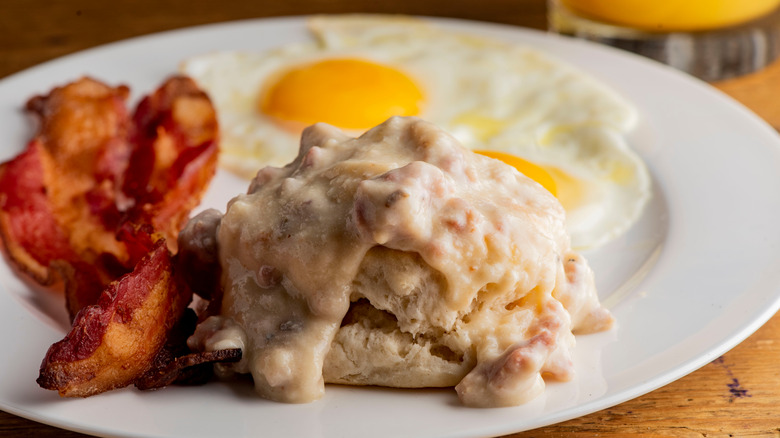Breakfast Restaurants Are Feeling The Impact Of Rising Egg Prices
Egg prices are through the roof, in large part due to an avian flu outbreak that saw over 43 million egg-producing hens killed in the U.S. during a 12-month period, according to The Associated Press. As a result of the avian flu, as well as other factors such as rising feed and fuel costs, the cost of buying a dozen eggs is now more than twice what it was a year ago.
The rising egg prices and avian-flu-related market shortages have definitely had an impact on consumers, leading some to seek unusual solutions. The New York Times, for example, noted accounts in two states of people purchasing chickens to produce eggs at home. And KTSM, a news outlet in El Paso, Texas, reports that egg seizures at border entry destinations are up 108%, as returning travelers try to smuggle in eggs from Mexico, where prices are cheaper.
It's not just consumers, however, who are trying to cope with soaring egg prices. Breakfast restaurants are also feeling the pinch, as inflated egg prices eat into their profit margins and force them to consider a host of unappealing options, observes Restaurant Business Online.
How breakfast chains are dealing with inflated egg costs
Eggs are a staple ingredient at many eateries, but they're an absolute essential for breakfast and lunch-focused establishments. As a consequence, rising egg prices have such restaurants in a major bind, according to Restaurant Business Online. Over the course of two calendar years egg costs for restaurants have nearly quadrupled. Laurie Wilbur, owner of the Maine-based Coffee Break Café recalled that a case of eggs cost $17 in 2016, per WABI. These days, she has to shell out over $73. Some businesses have been forced to cut portions or raise prices.
The restaurant chain Yolk, for example, is not only raising prices but has also attempted to promote menu items like pancakes, which aren't as egg intensive as omelets, reports Restaurant Business Online. Other chains, such as Denny's and brunch specialist Ruby Slipper, are refusing to change anything – at least for now – despite dwindling profit margins. The former has used its size and cooperative suppliers to help ameliorate the effects of rising egg costs. Ruby Slipper's CEO, Peter Gaudreau, notes prices are improving for many food items, and he's optimistic egg prices will follow suit this spring.
That assessment is borne out by CNBC, which quotes expert projections that egg prices will likely improve after the first quarter of the year, assuming of course there are no new avian flu outbreaks. Restaurant Business Online confirms that 10 million birds were recently slaughtered in Japan due to contamination fears.

